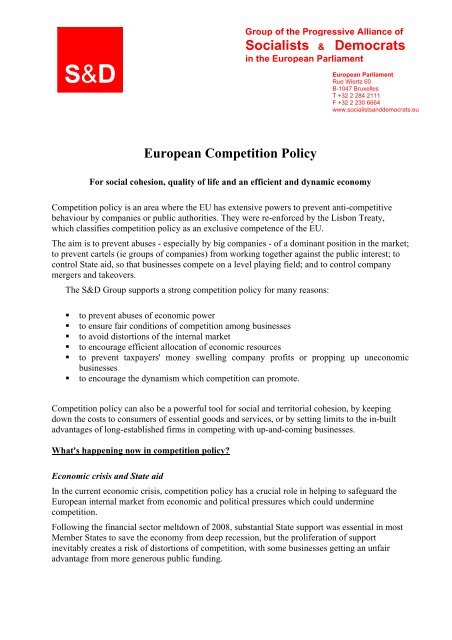European Competition Policy - Group of the Progressive Alliance of ...
European Competition Policy - Group of the Progressive Alliance of ...
European Competition Policy - Group of the Progressive Alliance of ...
You also want an ePaper? Increase the reach of your titles
YUMPU automatically turns print PDFs into web optimized ePapers that Google loves.
S&D<br />
<strong>European</strong> <strong>Competition</strong> <strong>Policy</strong><br />
<strong>Group</strong> <strong>of</strong> <strong>the</strong> <strong>Progressive</strong> <strong>Alliance</strong> <strong>of</strong><br />
Socialists & Democrats<br />
in <strong>the</strong> <strong>European</strong> Parliament<br />
For social cohesion, quality <strong>of</strong> life and an efficient and dynamic economy<br />
<strong>European</strong> Parliament<br />
Rue Wiertz 60<br />
B-1047 Bruxelles<br />
T +32 2 284 2111<br />
F +32 2 230 6664<br />
www.socialistsanddemocrats.eu<br />
<strong>Competition</strong> policy is an area where <strong>the</strong> EU has extensive powers to prevent anti-competitive<br />
behaviour by companies or public authorities. They were re-enforced by <strong>the</strong> Lisbon Treaty,<br />
which classifies competition policy as an exclusive competence <strong>of</strong> <strong>the</strong> EU.<br />
The aim is to prevent abuses - especially by big companies - <strong>of</strong> a dominant position in <strong>the</strong> market;<br />
to prevent cartels (ie groups <strong>of</strong> companies) from working toge<strong>the</strong>r against <strong>the</strong> public interest; to<br />
control State aid, so that businesses compete on a level playing field; and to control company<br />
mergers and takeovers.<br />
The S&D <strong>Group</strong> supports a strong competition policy for many reasons:<br />
� to prevent abuses <strong>of</strong> economic power<br />
� to ensure fair conditions <strong>of</strong> competition among businesses<br />
� to avoid distortions <strong>of</strong> <strong>the</strong> internal market<br />
� to encourage efficient allocation <strong>of</strong> economic resources<br />
� to prevent taxpayers' money swelling company pr<strong>of</strong>its or propping up uneconomic<br />
businesses<br />
� to encourage <strong>the</strong> dynamism which competition can promote.<br />
<strong>Competition</strong> policy can also be a powerful tool for social and territorial cohesion, by keeping<br />
down <strong>the</strong> costs to consumers <strong>of</strong> essential goods and services, or by setting limits to <strong>the</strong> in-built<br />
advantages <strong>of</strong> long-established firms in competing with up-and-coming businesses.<br />
What's happening now in competition policy?<br />
Economic crisis and State aid<br />
In <strong>the</strong> current economic crisis, competition policy has a crucial role in helping to safeguard <strong>the</strong><br />
<strong>European</strong> internal market from economic and political pressures which could undermine<br />
competition.<br />
Following <strong>the</strong> financial sector meltdown <strong>of</strong> 2008, substantial State support was essential in most<br />
Member States to save <strong>the</strong> economy from deep recession, but <strong>the</strong> proliferation <strong>of</strong> support<br />
inevitably creates a risk <strong>of</strong> distortions <strong>of</strong> competition, with some businesses getting an unfair<br />
advantage from more generous public funding.
The risk <strong>of</strong> recession justified <strong>the</strong> measures introduced by <strong>the</strong> Commission from <strong>the</strong> end <strong>of</strong> 2008<br />
to adapt <strong>the</strong> competition policy to <strong>the</strong> fragile economic situation and to direct <strong>the</strong> Member States<br />
in <strong>the</strong> definition and <strong>the</strong> adoption <strong>of</strong> <strong>the</strong>ir rescue operations, in particular in <strong>the</strong> banking sector.<br />
We strongly believe, for instance, that certain forms <strong>of</strong> recapitalisation <strong>of</strong> <strong>the</strong> banking sector were<br />
both justified and compatible with <strong>the</strong> EU Treaty. Among <strong>the</strong> lessons <strong>of</strong> <strong>the</strong> financial meltdown<br />
is <strong>the</strong> need for better procedures, to accelerate <strong>the</strong> attribution <strong>of</strong> aid in times <strong>of</strong> crisis. Outside <strong>the</strong><br />
realm <strong>of</strong> competition policy, <strong>the</strong> <strong>Group</strong> is determined to ensure that <strong>the</strong> interests <strong>of</strong> citizens and<br />
taxpayers are never again put at such risk by <strong>the</strong> financial.<br />
However, as economic recovery progresses, <strong>the</strong> S&D group wants to see a return to <strong>the</strong> normal<br />
application <strong>of</strong> competition policy and a transparent and coordinated phasing-out <strong>of</strong> aid, to correct<br />
distortions <strong>of</strong> competition and to avoid moral hazard.<br />
Sectoral competition surveys and inquiries<br />
The S&D group has strongly supported <strong>the</strong> sectoral surveys led by <strong>the</strong> Commission on sensitive<br />
sectors such as retail banking, pharmaceuticals and energy. These can uncover anti-competitive<br />
practices which lead to high prices, barriers to innovation and restricted consumer choice.<br />
An S&D rapporteur (Gianni PITTELLA) wrote <strong>the</strong> EP's report (adopted on 05/06/2008) on <strong>the</strong><br />
survey <strong>of</strong> retail banking which identified a lack <strong>of</strong> competition among banks and low consumer<br />
mobility. The EP report calls for vigorous Commission action to encourage consumer mobility<br />
and <strong>the</strong>reby increase pressures on banks to raise <strong>the</strong>ir standards <strong>of</strong> service and value for money.<br />
The <strong>European</strong> Commission has partly followed up on <strong>the</strong> EP demands especially in <strong>the</strong> area <strong>of</strong><br />
payment cards and in <strong>the</strong> framework <strong>of</strong> <strong>the</strong> SEPA (Single Euro Payments Area) direct debit<br />
scheme. But more still needs to be done on payment services charges for instance where <strong>the</strong><br />
industry is too slow to move to a true <strong>European</strong> system <strong>of</strong> payments with all related benefits for<br />
consumers in terms <strong>of</strong> efficiency, safety and price. The S&D group will certainly remind <strong>the</strong><br />
Commission in case <strong>of</strong> inaction.<br />
The S&D group is calling for wide-ranging Commission investigations <strong>of</strong> anti-competitive<br />
practices in:<br />
� food retailing and distribution, notably for milk products;<br />
� large investment banks<br />
� post market (clearing and settlement facilities)<br />
� auditing firms<br />
� credit rating agencies.<br />
Cartels and abuses <strong>of</strong> dominant position<br />
In 2008, <strong>the</strong> Commission's annual report on competition included for <strong>the</strong> first time a chapter on<br />
cartels and <strong>the</strong> consumer. This was an important departure because cartels are a major threat to<br />
<strong>the</strong> interests <strong>of</strong> consumers and to <strong>the</strong> efficient operation <strong>of</strong> <strong>the</strong> economy.<br />
The S&D group <strong>the</strong>refore welcomes <strong>the</strong> penalties, notably fines, imposed by <strong>the</strong> Commission on<br />
companies which broke competition rules <strong>of</strong> competition. But we want consideration to be given<br />
to o<strong>the</strong>r types <strong>of</strong> sanctions and to stronger measures in case <strong>of</strong> repeat <strong>of</strong>fending.<br />
In <strong>the</strong> car industry, <strong>the</strong> S&D group followed very closely <strong>the</strong> recent reform <strong>of</strong> competition<br />
policy, covering car sales, spare parts, repair and maintenance. These are big expenses for<br />
households. <strong>Competition</strong> among car and spare part manufacturers and among garages must be
sharpened, to bring down prices for consumers. Besides <strong>the</strong> adoption <strong>of</strong> a Resolution in May<br />
2010, <strong>the</strong> S&D group will remain vigilant to ensure that competition rules foster <strong>the</strong> emergence<br />
<strong>of</strong> small actors.<br />
MEPs working on competition policy<br />
*Gianni Pittella, substitute member <strong>of</strong> ECON;<br />
giovanni.pittella@europarl.europa.eu - tel. +32 (0)2 28 45159<br />
*Antolin Sanchez-Presedo, member <strong>of</strong> ECON;<br />
antolin.sanchezpresedo@europarl.europa.eu - tel. + 32 (0)2 28 45471<br />
*Udo Bullmann, member and S&D coordinator in ECON;<br />
udo.bullmann@europarl.europa.eu - tel. + 32 (0)2 28 45342<br />
*Elisa Ferreira, member <strong>of</strong> ECON;<br />
elisa.ferreira@europarl.europa.eu - tel. +32 (0)2 284 5164<br />
S&D Staff<br />
Marcel Mersch, Head <strong>of</strong> Unit, Economic and Social model;<br />
marcel.mersch@europarl.europa.eu - tel. +32 (0)2 28 42785<br />
Annabel Garnier, Political advisor;<br />
annabel.garnier@europarl.europa.eu - tel. +32 (0)2 28 41604





